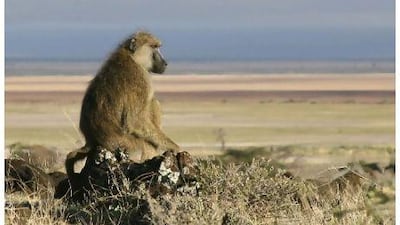WASHINGTON // With great power comes a great headache - even for baboons.
The results of nine years of research on wild baboons, published in the journal Science, suggest that despite perks like easy access to mates and food, top-ranking males experience similar stress levels as their lowest-rung counterparts.
Those in the middle showed lower stress than either the top or bottom ranking males, according to measurements of testosterone and a stress hormone known as glucocorticoid.
"Alpha males exhibited much higher stress hormone levels than second-ranking males, suggesting that being at the top may be more costly than previously thought," said the study led by researchers at Princeton University.
Samples were taken from the faeces of a wild male baboon population in Ambelosi, Kenya.
While the stress levels at the top and bottom were similar, they were likely caused by different problems.
Alpha baboons spent lots of energy fighting to stay on top and trying to mate with as many females as possible, while the low-ranking males expended lots of effort searching for food.

